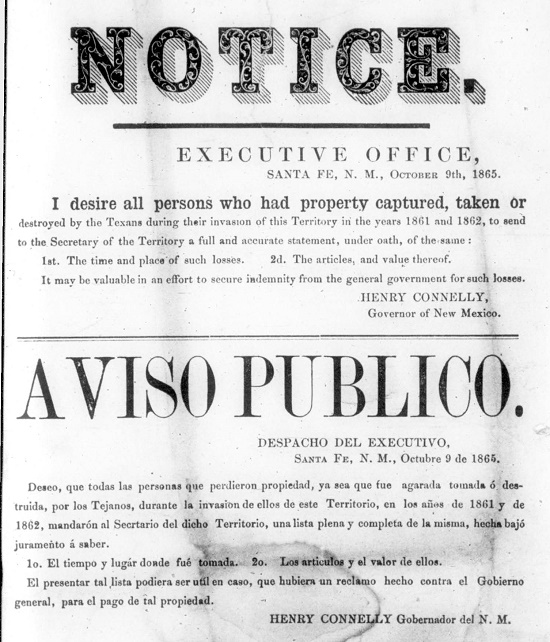‘A Melancholy Catalogue of Events’: Highlights from Territorial Papers of the United States

The April release of Territorial Papers of the United States, 1765-1953, has added more than 350 additional documents to this unique digital collection. Among them are the two Civil War-era reports below from top officials of the New Mexico Territory: Henry Connelly and William Frederick Milton Arny. Both were appointed to their positions by President Lincoln.
Third Annual Message of Governor Connelly to Legislature, December 6, 1864

Addressing “Gentlemen of the Council And House of Representatives,” Henry Connelly writes:
The mind of man is a mighty maze in which is engendered, not only the more amiable qualities of the heart, those which teach us charity towards our fellow-beings, and amiabilities of social life, but it is also the laboratory from which do sometimes issue the effects of passion, that lead to the unhappiness of the human race. Pride, envy, egotism, malevolence, and ambition, so unamiable in private life, frequently become criminal when carried into the discharge of public duties.
Connelly continues:
The exercise of these virtues is as essential in legislation as it is in the intercourse of social life. Courtesy in discussion, charity and consideration, with respect to the motives and intentions of your associates, and harmony in your councils, cannot fail to result in honor to yourselves and in benefit to the public.
After discussing Territorial finances, taxation, education, manufacturing, mining and the railroads traversing the region, Connelly—seemingly having forgotten the sentiments of his opening statement—turns his attention to “The Navajo. The Reservation. The Policy”:
The history of these Indians, in connection with that of the Territory, forms a melancholy catalogue of events, without a parallel, in the annals of Indian warfare, with a civilized and christian [sic] community. For more than one hundred and fifty years they have been the scourge of the people of this Territory; an incubus upon their prosperity and progress, and have left them, annually, a bare subsistence, gleaned by an imperiled industry, from the land in actual cultivation. Our pasture lands and the products thereof, have ever been subject to desolating forays, which have only ceased, for a time, when these enemies became satiated with plunder and spoils and chose to give us a few months or years of respite, that would enable us to increase our flocks sufficiently to make them a prize worthy of their rapacity.
Spain, Mexico and the United States have successively attempted the protection of our people against this desolating tribe. Every campaign against them, however fruitless, was followed by a treaty, which was seldom observed by them longer than was necessary for the troops to leave their country and arrive at their own quarters. Our Government having tried the experiment of war, treaties, annuities and reservations, in their own country, for eighteen years, without any effect upon their savage and predatory habits, has wisely resolved to prosecute an exterminating war against them, whose only terms of peace shall be, an exodus of the entire tribe from their mountain haunts, to a Reservation set apart for them on the Pecos River. The success which has attended its efforts in this great enterprise, has far exceeded the expectations of the most sanguine.
The governor next turns his attention to national affairs, namely the Civil War:
The war, for the preservation of the Union, in which our Government has been engaged for more than three years, would seem to be approaching a triumphant conclusion….The rebel forces, after the disastrous occurrences around Atlanta, defeated, dispirited, disorganized and reduced in number, seem to have offered no further resistance to the progress of our army, but to have dispersed into bands of guerrillas, for the purpose of annoyance upon our lines of communication.
Looking forward he concludes:
Such is the state of success now attending the national arms, and from which we may entertain the hope that peace may soon smile again, upon our distracted country.
New Mexico. Its Agricultural, Pastoral, Mineral and Other Resources

W. F. M. Arny begins:
The resources of the Rocky Mountains, and especially of the Territory of New Mexico, being scarcely known or appreciated, I propose to give a description of that Territory—as to its properties and the natural laws which must eventually give it position and character among the divisions of the United States.
And then provides this brief portrait of the land:
It is not a garden of Eden. On the contrary, the superficial observer would place his ideas of desolation within its limits; yet if he examines closely he will find an oasis amid the desert, and elements of wealth such as is the fortune of few countries to possess. It’s evil is, that it is arid, rainless, presenting contrasts to the American, come he from what part he may. It’s good: Pastoral resources unlimited as space, mineral wealth as vast as man’s comprehension can span; its valleys limited, but fertile as valleys can be; its climate equals Italy.
For more information about this digital collection, please contact sales@readex.com.



